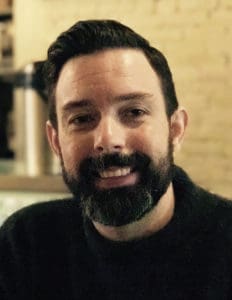Trinity Professor Awarded Fulbright Grant to Study Magic and Sorcery in West Africa
Trinity College Assistant Professor of Anthropology and Religious Studies Timothy R. Landry has been selected for a Fulbright award to the Africa Regional Research Program to study magico-religious objects used in sorcery in the country of Bénin. The Fulbright Program is the flagship international educational exchange program sponsored by the U.S. government, designed to increase mutual understanding between the people of the United States and the people of other countries. With his 10-month grant, Landry plans to begin his research in Bénin in the fall of 2019 and return to campus by fall 2020.

In Bénin, Landry said, a sorcerer is a morally neutral occult expert who uses objects, such as animal remains, to create a wide range of cures, powers, and charms for clients or family members. “I expect to find that the reason there’s an increase in the use of endangered animal parts—like chimpanzee hands or elephant tusks—is, in part, because people have invested in the idea that scarcity equals value,” Landry said. “It signals a pretty strong buy-in to capitalist values. Illicit, illegal, or forbidden objects become more desirable on the occult stage and these things become more magically potent. I think the ideas that they’ve taken to be true in capitalism have transferred into the ways that they practice religion. The increase in use of endangered animal parts seems to be evidence of that.”
Landry plans to interview sorcerers, their clients, and suppliers. “I hope to learn why they choose certain items over others, and how they market those objects to different clients,” Landry said. “I will be apprenticing with a sorcerer and learning sorcery myself. My typical research method is hands-on, as more of an observant participant, rather than a participant observer.” He will spend time in the cities of Ouidah, where he has conducted previous research and has established contacts, and Abomey.
The work Landry will be doing is closely related to the courses he teaches at Trinity, which include “Anthropology of Religion,” “The Occult in America,” “The Cradle of Voodoo,” and “Religions of Africa.” “I’m teaching a new class on magic, sorcery, and witchcraft across the globe, which I designed because of the research I’ve prepared for this project,” Landry said. “I hope my experience is going to enrich my classes.” He also teaches a January Term course in Bénin called “West Africa Abroad.”
Landry had been selected for two previous Fulbright awards: the Institute of International Education grant in 2010, which he received in graduate school to work on his first book in Bénin; and the Hays grant in 2010 for doctoral dissertation research abroad in Bénin, which he declined due to alternative funding. “This Fulbright grant enables me to do my work in a thorough way that I’m very grateful for, and to take the time to build trust. It also enables me to more actively hire research assistants while I’m there and involve the local population in the research,” Landry said.
“It is my hope that the book manuscript, research articles, and collaborative projects that come from this research will contribute to broader areas of anthropological concern including human-animal relations, wildlife conservation, conservation policy, globalization, religious economies, and current manifestations of religion in Africa,” Landry added.
Fulbright awards are highly competitive and emphasize the notability of the work by Trinity faculty members. Tim Cresswell, Trinity College dean of the faculty and vice president for academic affairs, said, “We share with Fulbright a commitment to a global perspective in scholarship and education, and Professor Landry’s success continues a notable line of successes by Trinity faculty applying for Fulbright awards to study around the world.”
In addition to Landry, Hobart Professor of Classical Languages Gary Reger was selected this year for a Fulbright award to Australia, where he will spend four months studying deserts at the University of Western Australia in Perth.
Trinity students and alumni are often recognized with Fulbright grants, as well. This year, three current students and one recent graduate have been awarded English Teaching Assistantship (ETA) grants through the Fulbright U.S. Student Program. Elizabeth Patino ’19 will teach in Mexico, Mariyann Soulemane ’19 in Malaysia, Maria Warns ’19 in Russia, and Mya Peters ’18 in Thailand.
The Fulbright Program offers grants for U.S. citizens to go abroad to study, teach, and conduct research and for non-U.S. citizens to come to the United States. The primary source of funding is an annual appropriation by the U.S. Congress to the U.S. Department of State’s Bureau of Educational and Cultural Affairs (ECA).
